Reflecting on “Storytelling as a Tool for Female Genital Mutilation/ Cutting (FGM/C) Survivor-Centered Change” at CSW 69
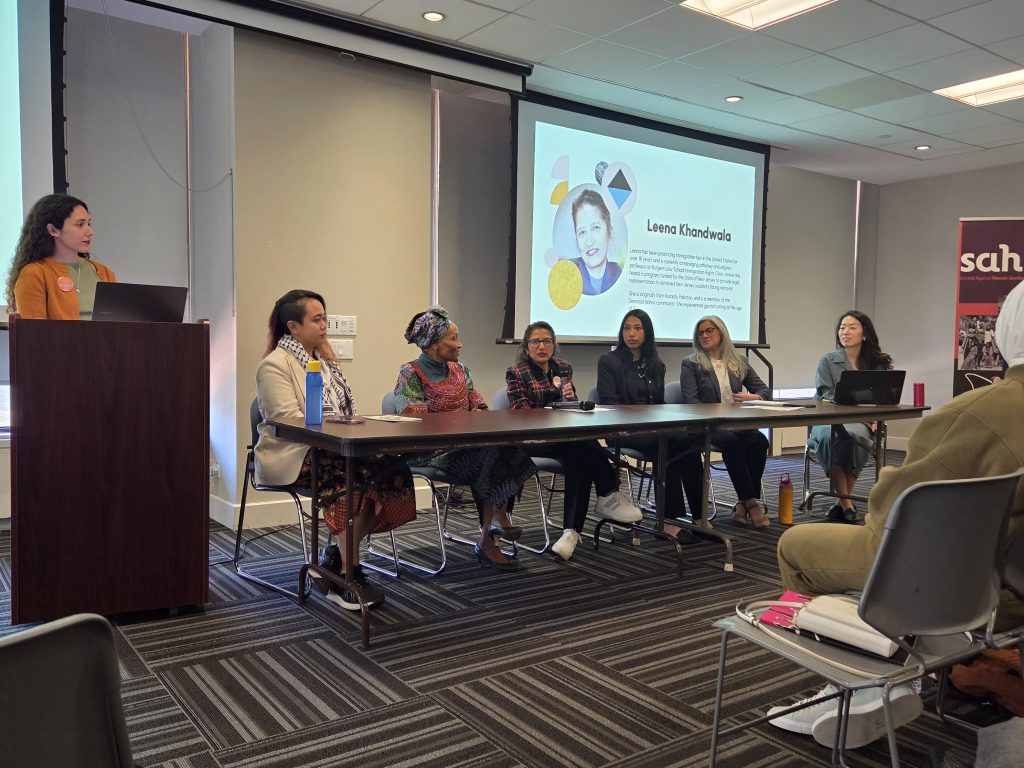
On March 18, 2025, Sahiyo co-hosted a powerful parallel session during the 69th Commission on the Status of Women titled “Storytelling as a Tool for FGM/C Survivor-Centered Change.” Organized in partnership with the Voices to End FGM/C program collaborators—Silence Speaks and the Asian Women’s Shelter—the event took place at the Church Center for the United Nations in New York. The event highlighted the experiences and powerful narratives of survivors and advocates, exploring storytelling as an effective method to foster understanding and drive social change. The session was facilitated by Sahiyo co-founder and Executive Director Mariya Taher and moderated by Su Young from the Asian Women’s Shelter. Speakers included Zehra Patwa, Dena Igusti, Saza Faradilla, Leena Khandwala, and Angela Peabody, each offering unique perspectives and deeply personal experiences to the conversation. During the panel, two of the storytellers, Zehra and Leena, reflected on the renewed and unexpected emotions they felt while watching their digital stories again. As participants in Sahiyo’s inaugural Voices to End FGM/C workshop (formerly called Sahiyo Stories), it had been a long time since they’d both viewed their stories, particularly in a public setting. This moment reminded us how powerful and vulnerable storytelling can be—even long after the initial release of the stories. As members of the Dawoodi Bohra community, both Zehra and Leena spoke about the resistance they’ve faced for addressing FGM/C openly. Still, they each shared how, at different moments in their journeys, speaking out has not only empowered them personally but has also helped spark dialogue and awareness within their families and broader social circles. Another impactful moment was the discussion around language. Saza, who recorded her story in Bahasa Melayu, shared that although she doesn’t feel especially fluent in her community’s native tongue, she felt strongly that it was important to tell her story in that language. For her, doing so was a way to reach members of her own community in Singapore and the broader diaspora. She expressed hope that her story might resonate with communities in Malaysia, Indonesia, and Brunei, where similar experiences are generally underrepresented, and oftentimes never even spoken of. Angela also shared a deeply personal reflection. Though not a survivor herself, she spoke about how creating her digital story during the workshop marked the first time she talked openly about what happened to her childhood friend who underwent FGM/C. She recalled seeing her friend again two years after she went into the Greibo bush and wondering why she no longer wanted to play with her. Angela’s story was a powerful reminder of how FGM/C can impact not only those who experience it directly but also those around them. Dena, a trans-nonbinary survivor of FGM/C, spoke openly about the internal struggles they faced while developing their digital story. They described grappling with feelings of not being “trans enough,” or even “a survivor enough.” Their vulnerability in naming these feelings brought attention to the nuanced layers of identity, belonging, and validation that many look for when deciding to share their stories publicly. Many attendees were excited and expressed a desire to see more of the digital stories and learn from Sahiyo’s storytelling model. We’re hopeful that these conversations will lead to new partnerships and expanded opportunities to support survivors in sharing their experiences, on their own terms and in their own voices. Visit our Voices to End FGM/C website to learn more!
Empowering Voices: The Launch of the Sharing Your Experience with Female Genital Mutilation/Cutting (FGM/C) Guide
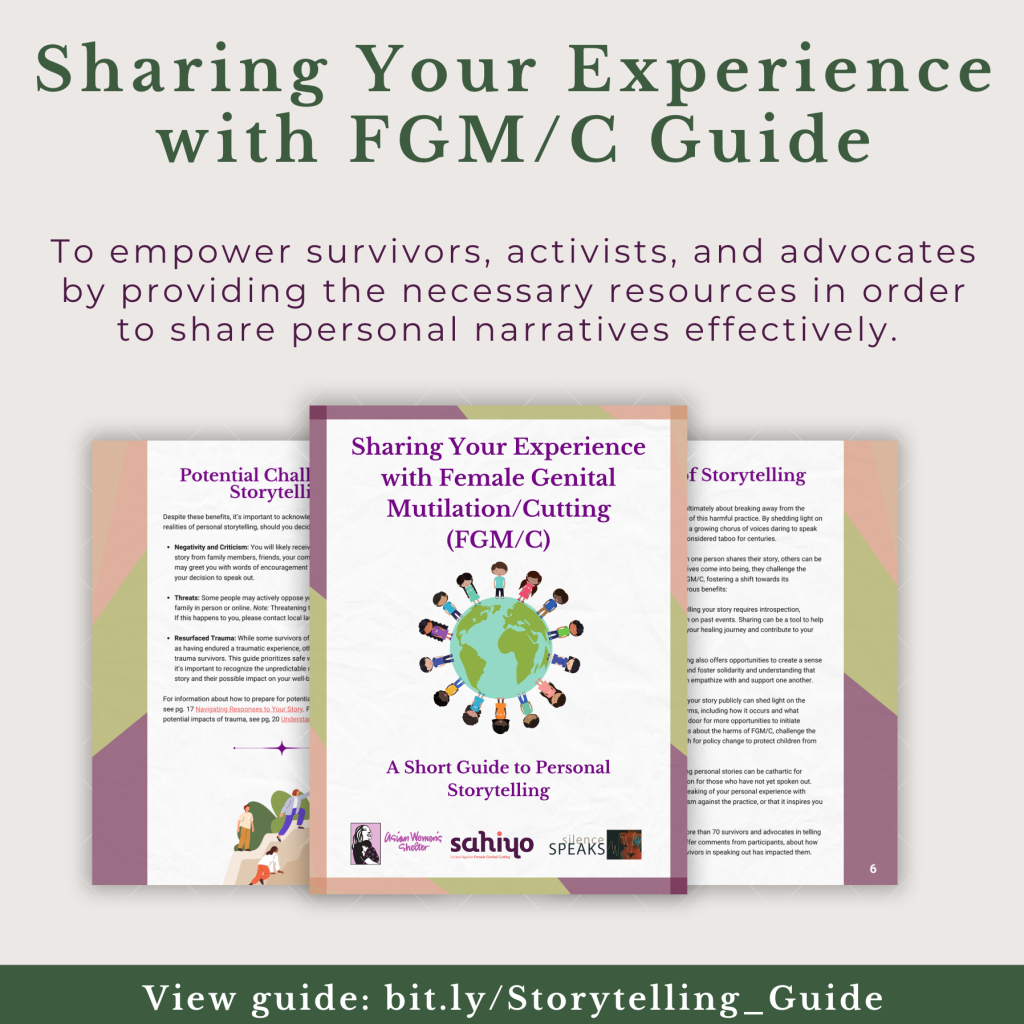
Sahiyo is excited to unveil our new guide, Sharing Your Experience with Female Genital Mutilation/Cutting (FGM/C), in partnership with the Voices to End FGM/C project. This project is a dynamic collaboration between Sahiyo U.S., Silence Speaks, and the Asian Women’s Shelter. This guide is designed to empower survivors, activists, and advocates by providing the necessary resources to learn how to share personal narratives publicly. This resource aims to amplify voices, educate communities, and, ultimately, mobilize individuals to take personal steps toward addressing female genital mutilation/cutting (FGM/C). What You’ll Find Inside: Writing Tips: Practical advice to help you craft and share your story in a way that feels right for you. Emotional Support: Insights on how to prepare yourself emotionally for the storytelling process. Public Sharing Guidance: Tips on how to share your story publicly, whether with friends, family, or a wider audience. Trauma Education: Information on the impacts of trauma and how to manage the feelings that might come up. We also encourage you to explore our Voices to End FGM/C website and discover the diverse stories from across the globe. Why This Guide Is Important Each story shared through this guide humanizes the issue of FGM/C, fostering empathy and inspiring action. For many survivors and advocates, sharing personal stories can be a powerful step towards healing and can also be a way for them to make a difference in their communities. Making space for people to tell their stories can help to transform feelings of helplessness into resilience and solidarity. By sharing our voices, we join in a brave community of survivors and advocates working to raise awareness and inspire change on this issue Ready to Share Your Story? If you’re ready to start sharing your experience with FGM/C, this guide is here to help. Your story is powerful and can make a significant impact in helping to raise awareness and support for ending FGM/C for future generations. Get the Guide You can access the guide today on the Voices website. You can also learn more about the Voices to End FGM/C program on Sahiyos website If you have any questions or need further support, please don’t hesitate to reach out to us. We’re here for you! Contact Us For any questions or more information on the Voices program, contact us at aries@sahiyo.org Your voice matters. Share your story and be part of the change.
Apply for our Voices to End FGM/C 2024 Hybrid Digital Storytelling Workshop!
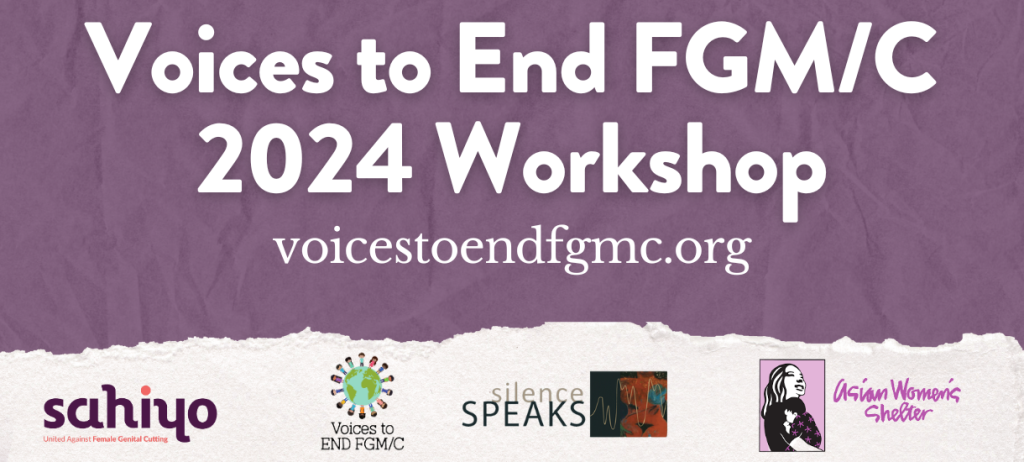
We are planning our second hybrid-format Voices to End FGM/C Digital Storytelling Workshop! This workshop offers a global platform for FGM/C survivors and community members affected by it to share their stories. When: Online Workshop Dates: May 28 and June 4, 4-6 pm PT / 7-9 pm ET In-person Workshop Dates: June 22-23 in Washington, D.C. 9 am – 5 pm ET (travel days: June 21 and 24, 2024) Who: Open to individuals in the U.S. impacted by FGM/C as well as allies passionate about raising awareness and ending the practice. What: Learn to craft impactful videos using techniques and mediums like voice-overs, images, and short clips guided by facilitators from Sahiyo, SilenceSpeaks, and Asian Women’s Shelter. Post-Workshop: Sahiyo will assist participants in sharing their videos publicly as part of our advocacy efforts to raise awareness. Apply by April 15, 2024 to be part of the ninth Voices to End FGM/C cohort!For inquiries, contact Aries at aries@sahiyo.org. You can also visit our website to learn more about the project and watch past workshop videos!
Survivors Speak: Stories of Healing and Action
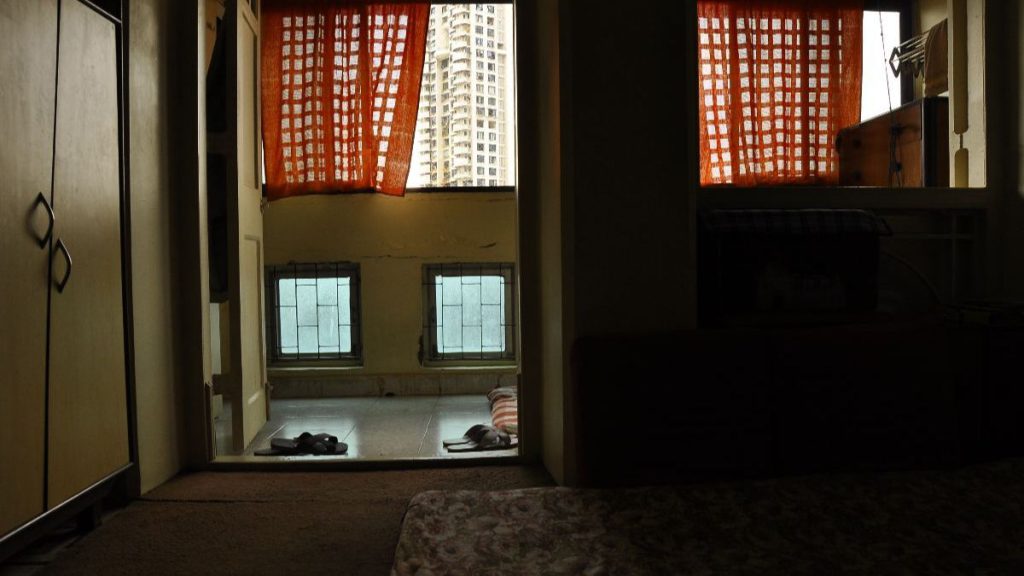
Please join Sahiyo, Asian Women’s Shelter, and Silence Speaks on November 28th at 4 pm Pacific / 7 pm Eastern for an informal one-hour webinar on trauma-informed storytelling to address gender-based violence. In honor of the 2023 16 Days of Activism Against Gender-Based Violence global campaign (November 25 through December 10), the three organizations are collaborating to offer a safe, online space for individuals to learn about the theory and practice of behind their years-long trauma-informed, collaborative work to support survivors of domestic and sexual violence, female genital mutilation and cutting (FGM/C), and other forms of abuse. In 2018, their Voices to End FGM/C collaborative project was initiated, today it, showcases 75 compelling stories, featuring participants from 19+ countries whose stories have garnered over 99,000 views across multiple social media platforms. These impactful narratives have not only reached a wide audience but have also been the focal point of 13+ public video screenings, in addition to serving as tools for education, community mobilization, and advocacy for justice. The webinar on Nov 28th is being hosted to foster solidarity amongst survivors who have shared their stories and who hope to do so. Register here!
Sahiyo partners with Gulabi Stories for a Voices screening session
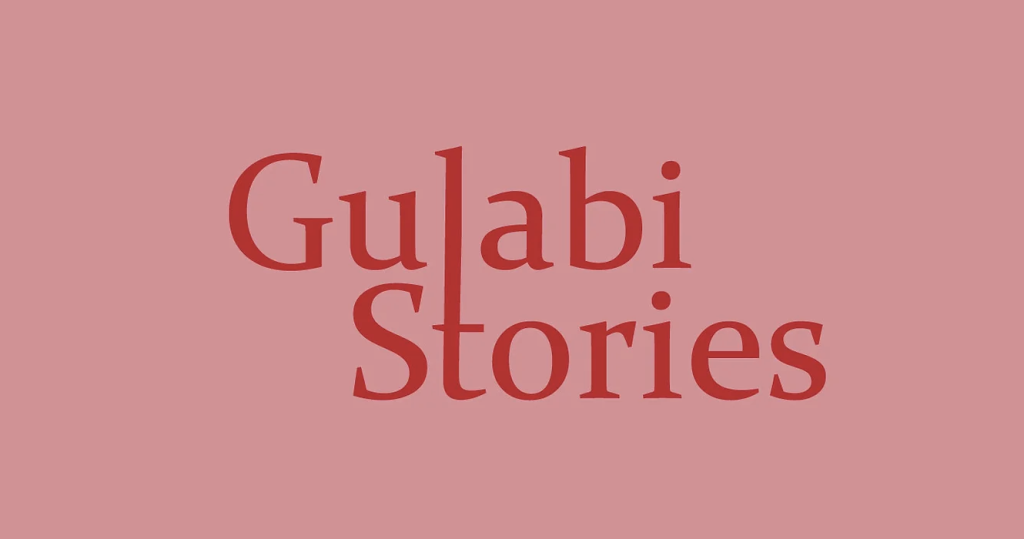
On September 5th, Gulabi Stories hosted a discussion-based event with support from Sahiyo called Holding Conversation on Survivorship & Healing. This virtual gathering brought together individuals from diverse backgrounds to screen and hold space to discuss a few of the digital stories from Sahiyo, StoryCenter, and Asian Women’s Shelter’s Voices to End FGM/C project. In this intimate setting, the Voices stories sparked reflection and dialogue around deep-seated issues related to female genital cutting (FGC). Throughout the screening, we explored themes of reconciliation, acceptance, the quest for closure and understanding, the profound impact of FGC on personal relationships, and the transformative journey of self-definition while challenging societal norms. If you are interested in hosting your own Voices screening session, please reach out to Aries Nuño, Sahiyo’s Training and Technical Assistance Coordinator, at aries@sahiyo.org.
Sahiyo held its 8th Voices to END FGM/C Workshop in California

Sahiyo is thrilled to announce the successful conclusion of our 2023 Voices to End FGM/C workshop! This collaborative endeavor, orchestrated by the dedicated teams at Sahiyo U.S., StoryCenter, and the Asian Women’s Shelter, brought together nine extraordinary women from diverse cultures and backgrounds on an inspiring journey of storytelling. The workshop began with two virtual sessions, fostering a profound sense of community and connection as participants joined online from all across the United States. During the second session, participants shared personal narratives around their experience with FGM/C, whether as survivors, advocates, and/or activists, within a supportive story circle. This laid the foundation for the powerful stories that would follow. For the in-person segment, participants met in Berkeley, California to immerse themselves in an enriching, hands-on experience. Over the course of two days, participants learned about the art and different elements of creating a digital story. They worked collaboratively, capturing and combining their voices with moving imagery, and creating videos that beautifully encapsulates the essence of their narratives. In the coming months, these inspiring videos will be finalized and prepared for public debut, becoming powerful tools to further amplify the voices of these women and their advocacy to end FGM/C. We extend our heartfelt gratitude to everyone who participated and supported this workshop, and we eagerly anticipate the impact of these stories as they contribute to the ongoing dialogue and change surrounding this critical issue.
Learn more about how to use Digital Storytelling for Advocacy!
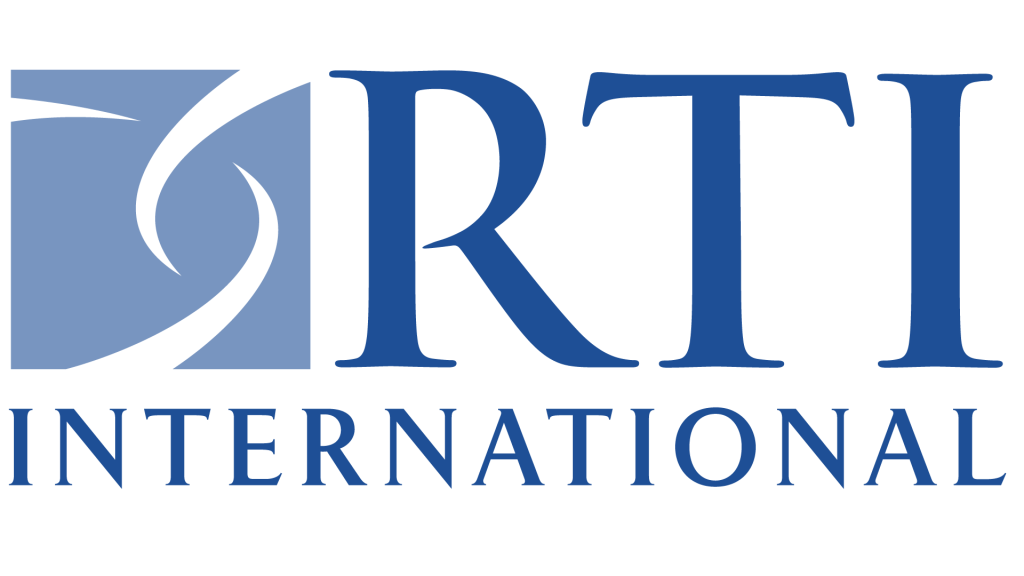
On August 1st, RTI International will host a webinar on digital storytelling with speakers Mariya Taher from Sahiyo and Amy Hill from StoryCenter. Since 2018, Sahiyo and StoryCenter have collaborated on the Voices to End FGM/C project. In this 90 minute introductory webinar, the webinar will provide an overview of the project’s theoretical underpinnings, participatory media workshop methodology, and approach to sharing stories for education and advocacy. Sample Voices videos will be screened, and ample time will be available for questions and discussion. Register for the event here.
South Asian SOAR launches Zine
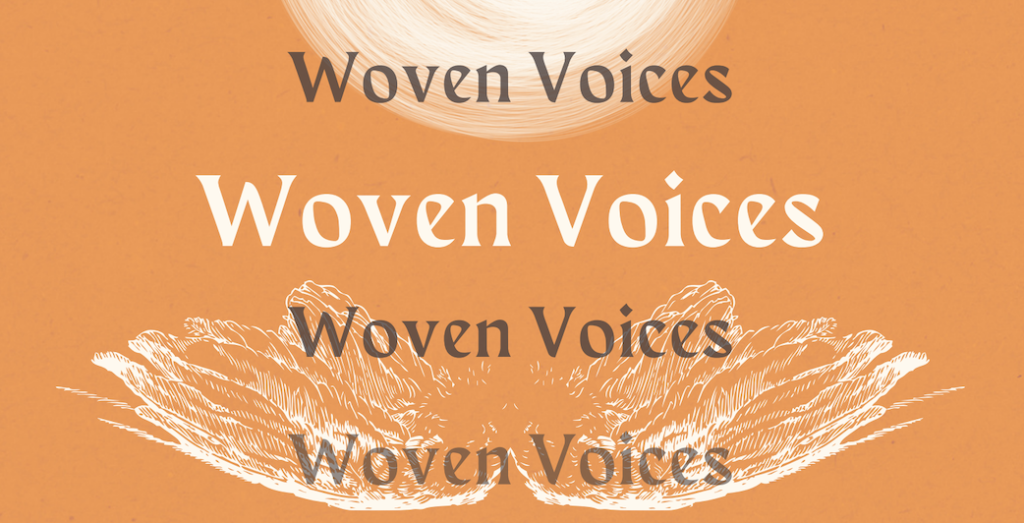
In May 2023, South Asian SOAR launched a Zine to commemorate and honor the stories of 16 South Asian survivors of gender-based violence who took part in their 2022 pilot storytelling workshop. The program consisted of a Storytelling Workshop, ongoing Story Circles, & additional opportunities to build community and continue working on stories (learn more about the program). The Zine was co-created by and features the stories of survivors, told through narratives, poetry, videos, artwork, and more. One of the pieces featured in the Zine is Sahiyo co-founder and Executive Director Mariya Taher’s story Shattered Silences, from Sahiyo’s Voices to End FGM/C project. SOAR seeks to empower South Asian survivors with the goal of moving towards a future free of violence. View the Zine here.
How to have a dialogue: Storytelling & Conversations

By Huda Syyed It took me a while to realise that research isn’t just about crunching numbers and gathering quantitative data. When dealing with issues such as female genital cutting (FGC), human interaction and communication can play a more important role than numbers; to open up and speak about one’s experience of FGC requires a high level of trust and safety. It is important to create a safe and trusting place for those who have survived FGC and are sharing their stories. I think this is why it’s best to let survivors narrate their own stories and navigate conversation at their own pace. In my short experience as a researcher, I learnt how important it is to have conversations that relay the stories and backgrounds of people. Without understanding the stories of people, it is impossible to collect qualitative data about culture and communities. Interviewing research participants also has an element similar to storytelling because people can share details about their background, an event or even a practice. Consent and comfort are primary indicators of whether or not a person is willing to share their thoughts, and I think it is important to acknowledge these indicators before starting a conversation to ensure that there is an ethicality to storytelling. Any hints of discomfort and hesitation on the part of the survivor should be taken seriously to make sure that re-traumatization does not occur. The well-being and readiness of people should be of utmost priority to researchers, because true storytelling does not come from a place of coercion or reluctance. Storytelling is an effective way to open dialogue or start a conversation about FGC. Voices to End FGM/C, a collaboration between Sahiyo and StoryCenter, is an example of survivors sharing their experiences to create more awareness, understanding, and public dialogue about the practice, with a prioritized sense of agency in creating their own story. What began with Sahiyo co-founder Mariya Taher sharing her own story and encouraging other women in the United States to come forward with their stories has had a ripple effect, and we continue to see Sahiyo engaging in extensive dialogues. Other Sahiyo programs like Bhaiyo were created to include men in this necessary dialogue, as well as “to provide love, support, and community towards the advocates and survivors working to end FGC.” Something that started off among women has grown into a larger platform where friends, fathers, brothers and husbands are coming forward to end FGC together. The biggest takeaway from this is how storytelling and conversations created a domino effect and led to more people learning and talking about FGC. From a research perspective, storytelling and conversations can lead to more data, which helps us understand the practice and its impact. My research focuses on Pakistan, where there is very little data and no public record of FGC, thus creating a huge research gap yet to be explored. I think storytelling and conversations could be the start of creating more awareness and understanding of FGC in Pakistan. Since any topic that deals with female genitalia or sexuality is seen as shameful in Pakistani society, it may take a while for people to engage in open dialogue about FGC. Due to cultural and religious connotations, people are hesitant about discussing such topics because they are considered inappropriate. Patriarchal undertones within Pakistani society frame women’s bodies as non-autonomous and often under the surveillance or submission to the male figure. Honour killings and other gender-based violence crimes take place under the notion that women’s bodies carry the honour of husbands, brothers or fathers. These assumptions about women and their bodies probably adds to the invisibility or lack of dialogue regarding female genital cutting (FGC). It is not uncommon to find qualitative researchers exploring topics of gender-based violence and women’s rights through stories and narratives. It gives social scientists a deeper insight into how culture, gender, and society work. In such cases, I don’t think quantitative data can capture people’s experiences or the cultural or religious attributes attached to them. Storytelling and conversations give researchers the space to gather data as listeners or bystanders, while allowing the story-teller/interviewee/conversationalist to share details on their own terms. I will end my thoughts on this note: “If story is central to human meaning why, in the world, is there not more storytelling?”
Reflections on research: Digital Storytelling as a narrative intervention for survivors of FGM/C

